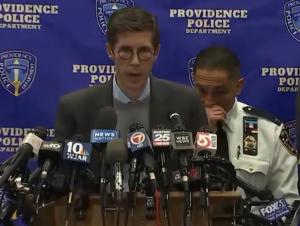A Routine Call Becomes Anything But
The midday sun beat down on the crowded intersection of Fifth and Madison, where office workers hurried toward lunch spots and tourists consulted their phones for directions. It was the kind of urban corner where a hundred small dramas played out daily, mostly unnoticed—until one Tuesday morning when a patrol car pulled to the curb and two officers stepped into a scene that would unravel far more than a simple street vending violation.
Officer Jake Morgan had been with the department for eight years, long enough to recognize the difference between malice and desperation when he saw it. What he saw now, standing beside a makeshift vegetable stand, was desperation wrapped in dignity and held together with threadbare determination.
The vendor was a woman in her early sixties, though hardship had aged her beyond her years. She wore a faded cardigan that had been washed so many times the original color was anyone’s guess, and a skirt with a hem that had been re-stitched multiple times with thread that didn’t quite match. Her hands—weathered and work-worn—carefully arranged tomatoes, carrots, and cucumbers on a wooden crate with an attention to detail that suggested this simple display was the most important thing in her world.
She looked up as Jake approached, and he saw something flicker across her face—not defiance or anger, but a bone-deep weariness mixed with what looked unsettlingly like relief.
“Ma’am,” Jake said gently, his training and his humanity finding that careful balance between enforcement and empathy, “you know street vending without a permit isn’t allowed here, right?”
The Woman Who Wanted Them Gone
The woman’s eyes stayed down, fixed on the vegetables she’d arranged with such care. “Yes, dear,” she murmured, her voice barely audible above the city noise. “But my boy needs medicine. I grew these in my little garden. I’m not hurting anyone.”
Sergeant Daniel Ruiz, Jake’s supervisor and a twenty-year veteran who’d learned to read people the way scholars read ancient texts, stepped forward. The rules were clear—street vending without proper permits and health inspections was illegal for good reasons. But rules existed in the real world, where a mother with a sick child sometimes made desperate choices.
“Look,” Ruiz said, his tone softening, “we’ll ask you to move along this time. Please try to find another way to get what you need. Other officers might not be as understanding.”
“Yes—thank you, thank you,” the woman said, the words tumbling out too quickly, with an urgency that seemed disproportionate to the minor warning she’d just received. Her relief felt wrong somehow, excessive, as if she needed them gone for reasons that had nothing to do with avoiding a citation.
Jake, whose instincts had been honed by years of reading body language and catching the small tells that separated ordinary from suspicious, decided to extend an olive branch.
“At least let us buy some tomatoes,” he offered with a warm smile. “They look great, and it’d help you out.”
The woman’s reaction was immediate and jarring. “No need, dear,” she said, her voice suddenly trembling. “I’m… I’m very busy today.”
Jake’s partner, Officer Maria Santos, blinked in confusion. “Busy? Ma’am, there’s no one else here. No customers at all.”
“They came earlier,” the woman said, forcing a thin, nervous smile that didn’t reach her eyes. “In the morning. You must have missed them.”
Jake reached toward a particularly perfect-looking tomato, still trying to help despite her strange refusal. “Then we’ll just take this one and leave payment—”
“Please!” The word came out sharp, almost panicked. “Leave those for the others. For the people who… who need them.”
Her hands were shaking now, he noticed. And her eyes kept darting past them, toward the far corner of the intersection, as if she were tracking something—or someone—they couldn’t see.
The Tomato That Felt Wrong
Jake picked up the tomato anyway, intending to leave cash on the crate despite her protests. But the moment his fingers closed around it, something felt off.
He’d grown up helping his grandfather tend a backyard garden. He knew what a ripe tomato felt like—the give of real flesh beneath skin, the pleasant heft, the warmth from soaking up sunlight. This looked perfect: brilliant red, no blemishes, the kind of tomato you’d see in a magazine spread about farmers’ markets and organic produce.
But it felt wrong.
Too light. Too uniform. And when he turned it slightly, catching the light at a different angle, he saw something that made his blood run cold: a hairline seam around the stem cap, barely visible unless you were looking for it.
He pressed gently, experimentally. Instead of the slight yielding of fruit flesh, he felt something crinkle—that distinctive sound of plastic against plastic, of something manufactured rather than grown.
Jake’s expression changed instantly, his friendly demeanor replaced by the focused alertness of an officer who’d just stumbled onto something significant. “Sarge,” he said quietly, his tone carrying enough weight that Ruiz immediately stepped closer.
Jake palmed the tomato and showed Ruiz the seam, tilting it so his supervisor could see what he’d discovered. No words were needed; the look that passed between them said everything: this wasn’t about vegetables anymore.
Ruiz’s jaw tightened. His voice, when he spoke, had lost all warmth, replaced by the flat, procedural tone of an officer moving from community interaction to active investigation. “Detain her. Now.”
“I’m Not a Criminal”
The handcuffs clicked shut around the woman’s thin wrists, and she seemed to fold into herself, shoulders curling inward as if she could make herself disappear through sheer force of will.
“Please,” she gasped, her voice breaking, “I’m not a criminal. I swear I’m not—”
“Ma’am,” Jake said, keeping his voice steady but not unkind, “we need to understand what’s inside these. We need to make sure whatever this is won’t hurt anyone.”
They transported her to the precinct in careful silence, the crate of “vegetables” secured as evidence. The woman—they’d learned her name was Elena Markham—sat in the back of the patrol car with tears streaming silently down her weathered face, not speaking, barely breathing, her entire body rigid with what looked like resignation rather than fear.
Back at the precinct, the inspection was methodical and documented at every step. Jake, now wearing gloves and working under the bright lights of the evidence processing room, carefully examined the first tomato. The stem cap came away easily once you knew it was designed to, revealing not the white flesh and seeds of a real tomato but a hollow chamber lined with transparent plastic film.
Inside: thin sachets, prepaid debit cards with activation stickers still attached, SIM card trays containing what looked like cloned phone chips, laminated ID slips with photos that didn’t match the names, and tiny electronic devices that Jake recognized with a sinking feeling as credit card skimmers.
The second tomato revealed more of the same. Then a third. Then a cucumber that had been hollowed out and filled with tightly rolled bills—not pocket money, but substantial amounts in various denominations.
This wasn’t a desperate mother selling vegetables to pay for medicine. This was a sophisticated distribution system using human camouflage—a woman who looked poor and harmless serving as a mobile dead drop for whatever criminal operation was sophisticated enough to hollow out fake produce and patient enough to use a street vendor as their courier.
The Story She’d Been Carrying
In the interview room, Elena sat small and broken in the metal chair, her fingers compulsively twisting the hem of her cardigan—a self-soothing gesture that spoke of long-term anxiety and trauma.
For twenty minutes, she said nothing beyond confirming her name and address. Then, as if a dam had finally broken, the story poured out.
“My son—his name is Michael—he’s twenty-three,” she began, her voice hollow. “He has diabetes. The complicated kind, where his blood sugar spikes and crashes without warning. The insulin he needs, the good kind that actually works consistently, it costs more than I make in three months. The clinic kept saying there were programs, assistance, waiting lists. But Michael couldn’t wait. I watched him getting sicker while I filled out forms that led to more forms.”
She paused, wiping her eyes with the back of her cuffed hands—an awkward, heartbreaking gesture.
“Six months ago, a man approached me at the community garden where I volunteer. He knew my name. He knew about Michael. He knew exactly how desperate I was.” Her voice dropped to barely a whisper. “He said there was ‘work’ I could do. Easy work. Safe work. Just stand on that corner with my vegetables—real vegetables I actually grew—and wait. People would come. Specific people. They’d take what they needed. I wasn’t to ask questions. I wasn’t to sell to anyone else. Just stand there and look harmless.”
“What was his name?” Ruiz asked.
“They called him Mr. Mercer,” Elena said, and something about the way she said it suggested the name was as fake as the tomatoes. “He said if I told anyone, if I refused, if I even thought about going to the police, he would make sure Michael’s medications ‘disappeared’ from every pharmacy in the city. He’d make sure we lost the tiny room we rent. He knew our address. He knew Michael’s doctor’s name. He knew everything.”
Jake leaned forward, keeping his voice gentle. “How often did you do this?”
“Twice a week. Wednesday and Saturday mornings. They’d meet me in the alley behind the parking structure at dawn. They’d take my real vegetables—the ones I actually grew—and give me the… the fake ones. The ones with things inside. I never looked. I never asked. I was too afraid.”
She looked up at them with eyes that held a terrible, defeated clarity. “They told me if anyone got too curious, if police asked questions, I should just say I was selling vegetables and didn’t know anything. They said they’d be watching. They were always watching. From across the street, from cars, from somewhere. I could feel them watching.”
Jake studied the crosshatched lines on Elena’s palms—calluses from real garden work, earned over decades of tending actual plants. She’d been chosen precisely because she looked authentic, because her story about growing vegetables in a backyard garden was true. The criminals had simply weaponized her authenticity, turned her desperation into a perfect disguise.
When Law Meets Mercy
They booked her—because evidence and procedure demanded it, because the district attorney would need everything documented properly—but not like a hardened criminal. Jake brought her tea. Ruiz called Rachel Lin, a social worker who specialized in cases where poverty and coercion intersected, explaining the situation and requesting immediate intervention.
Then Ruiz made another call, this one to Dr. Maya Patel at the free clinic two miles from the precinct. “I have a complicated case,” he said carefully. “A young man with Type 1 diabetes whose mother made some terrible choices because she couldn’t afford his insulin. Can you help?”
Dr. Patel, who’d worked with the police on similar cases before, didn’t hesitate. “Bring him in. We’ll figure it out.”
But helping Elena wasn’t enough—not when the people who’d exploited her desperation were still out there, still watching that corner, still waiting for their next “delivery.”
What came next required precision, paperwork, and the kind of careful planning that separated successful investigations from disasters that endangered civilians.
Setting the Trap
Detective Sarah Chen, who’d been called in to coordinate with the precinct officers, laid out the plan with the meticulous attention to detail that had made her one of the department’s most successful investigators.
“We send Elena back,” she said, “but this time, she’s working with us. We reassemble the crate—legally, with proper documentation and photographic evidence of every step. We put her back on that corner with surveillance from multiple angles. And we wait.”
“She’s terrified,” Jake protested. “These people threatened her son.”
“Which is exactly why we need her cooperation to catch them,” Chen countered, not unkindly. “Michael is in protective custody with medical supervision. Elena knows this. She’s agreed to help because she understands these people will just find another desperate mother if we don’t stop them now.”
Elena, when asked directly, had nodded with a determination that seemed to surprise her own frightened self. “If I can help you catch them,” she’d whispered, “then maybe some other mother won’t have to make the choice I made.”
So late that afternoon, as the sun began its descent and long shadows stretched across the intersection, Elena Markham returned to her corner. She wore the same faded cardigan, stood behind the same wooden crate, arranged the same (carefully documented) fake vegetables with the same careful precision.
But this time, six undercover officers watched from strategic positions. This time, Detective Chen monitored from a surveillance van half a block away. This time, when the handlers came to collect their goods or check on their courier, they wouldn’t simply melt back into the city.
The Shadow Steps Forward
He arrived on a silver scooter at 5:47 PM, parking farther from the crate than any legitimate customer would. A man in his mid-thirties wearing a baseball cap pulled low and mirrored sunglasses that hid his eyes—the uniform of someone trying to look unremarkable while actually drawing attention through their very effort to appear casual.
He didn’t approach Elena directly. Instead, he walked past once, eyes scanning the street with the practiced caution of someone who’d been trained to spot surveillance. He doubled back, this time stopping to examine a street sign as if confused about directions.
Only then did he approach the crate, still not looking at Elena directly, as if she were merely part of the urban furniture rather than a human being.
His hand reached for a tomato—not randomly, but with purpose, fingers finding the stem cap immediately. He started to twist it in the specific way needed to open the hidden compartment.
Jake stepped in smoothly, badge already visible, his hand on his service weapon but not drawn. “Police. Keep your hands where I can see them and step away from the crate.”
The man bolted.
The chase was brief and undramatic—no movie-style parkour or dramatic rooftop pursuits. Just a fit criminal running at full speed through an intersection where six officers had already positioned themselves to cut off every escape route. He made it half a block before Officer Santos, who’d been a collegiate track athlete, caught up and brought him down with a textbook tackle.
In his messenger bag: more hollowed-out produce, more fake vegetables designed to pass casual inspection. More prepaid cards, more SIM chips, more of the infrastructure for identity theft and financial fraud.
His wallet contained five IDs under different names. His phone, when forensically examined later, would reveal a network that stretched across three states and involved dozens of “vendors” just like Elena—desperate people whose poverty made them vulnerable, whose desperation made them controllable.
The name on his driver’s license: Kade Mercer. Not “Mr. Mercer” after all—just Kade, a thirty-six-year-old with priors for fraud and a talent for finding people at their most desperate and turning that desperation into profit.
The Network Unravels
Kade Mercer’s arrest was just the beginning. His phone led to other phones. Those phones led to bank accounts. Those accounts led to safe houses where they found equipment for manufacturing fake IDs, credit card encoders, and boxes of hollowed-out produce waiting to be filled and distributed.
Two more arrests followed within forty-eight hours. A woman named Yvette Cho who’d been manufacturing the fake vegetables in a warehouse in the industrial district. A man named Marcus Webb who’d been coordinating the network of desperate “vendors” across the city—fourteen people, all with similar stories of medical bills, threatened evictions, sick children, and impossible choices.
When they laid out the evidence—thousands of photographs, hours of surveillance footage, financial records showing over $2.3 million in fraud proceeds over eighteen months—even the public defender assigned to Kade Mercer’s case looked disgusted.
“My client,” she said during the arraignment, with the particular weariness of someone who’d spent too many years defending the indefensible, “has no comment at this time.”
Not an Ending—A Beginning
The district attorney reconsidered charges against Elena Markham in light of documented coercion—voicemails from Mercer containing explicit threats, financial records showing debts that had mysteriously grown despite regular payments, and medical files proving why she’d been so desperately vulnerable to exploitation.
The charges weren’t dropped entirely—the law couldn’t ignore that she’d knowingly participated, regardless of coercion. But they were reduced to a misdemeanor with provisions for community service and mandatory counseling rather than jail time.
“You made bad choices,” the prosecutor told her during a meeting Jake attended in his role as the arresting officer. “But you were placed in an impossible situation by people who are predators. We’re not interested in destroying your life further. We’re interested in making sure this doesn’t happen again—to you or anyone else.”
Michael Markham’s insulin situation was resolved through a combination of clinic assistance, a pharmaceutical company’s patient assistance program that Dr. Patel knew how to navigate, and a new state program that had just been implemented for exactly these cases but which no one had told Elena about because bureaucracy moves slowly and desperation moves fast.
A neighborhood nonprofit helped Elena apply for a legitimate street vendor permit. The application process took three months, required a food safety course, and cost money she didn’t have until the nonprofit covered the fees. But eventually, she stood on her corner again—legally this time, with proper permits and real vegetables that weighed exactly what vegetables should weigh.
When Jake stopped by on his day off, she was rearranging tomatoes beside cucumbers and carrots, all real this time, all honestly sold.
“Officer,” she said, her eyes bright with something that looked like tentative hope, “I never wanted any of that. I just wanted medicine for my son.”
“I know,” Jake said quietly. He bought two bags of vegetables he didn’t really need and carried them anyway, understanding that sometimes the best thing you can do is bear witness to someone’s effort to rebuild a life from rubble.
What the Tomato Weighed
Later that evening, writing his final report on the case, Jake found himself pausing on a detail that had started everything: The tomato felt too light.
That’s what had begun it—the difference between appearance and reality, between what something looked like and what it actually weighed when you held it in your hand.
The case had required rules and mercy, procedure and compassion, enforcement and understanding. None of those things were opposites; they were tools, and knowing which tool to use when made the difference between destroying a life and saving one.
A criminal network had been dismantled. Fourteen vulnerable people who’d been exploited were now connected with resources and support. One mother got back the life she’d thought she’d traded away to fear and desperation. One son got the medicine that kept him alive.
No newspaper headlines celebrated this particular victory. No press conference was held. Just a routine patrol call that had become anything but routine, a case file that would gather dust in an archive somewhere, and a corner of the city that was incrementally safer than it had been before.
And one officer who would never look at a tomato the same way again, who’d learned that sometimes the most important part of law enforcement isn’t catching criminals—it’s seeing the people caught between bad choices and impossible situations and finding a way to offer them a third option.
Six Months Later
Elena Markham’s corner became modestly successful. Not enough to make her wealthy, but enough to make ends meet. She sold vegetables three days a week—real ones, heavy with juice and sun, grown in community garden plots she tended with the same careful attention she’d once been forced to give to fake produce.
Michael’s diabetes was managed through a combination of affordable insulin, regular clinic visits, and a nutritional education program that helped him stabilize his blood sugar without the constant emergency interventions that had defined their lives before.
Kade Mercer and his co-conspirators were convicted on multiple federal charges—wire fraud, identity theft, extortion, and organized criminal activity. The sentences ranged from eight to fifteen years. The judge, during sentencing, specifically noted that while the financial crimes were serious, the real harm was in how they’d exploited desperate people.
“You didn’t just steal money,” Judge Patricia Warren said. “You stole hope from people who were already hanging on by their fingernails. You turned their desperation into your profit. That, in my view, is the truly unforgivable crime.”
Jake Morgan, who attended the sentencing, felt a complicated mixture of satisfaction and sadness. Justice had been served, but justice was cold comfort for the Elena Markhams of the world who’d been victimized twice—once by circumstance, once by criminals who weaponized that circumstance.
He drove by Elena’s corner sometimes on patrol, usually just a wave and a quick check that everything was okay. Once, during a particularly slow afternoon, he stopped to buy tomatoes again.
“Heavy ones this time,” he said with a smile, weighing one in his palm.
“Always,” Elena replied. “Always.”
And in that simple exchange—a transaction that was now exactly what it appeared to be, nothing hidden, nothing weaponized—was a small victory that newspaper headlines would never capture but that mattered more than most of what made the news.
The Lesson in Weight
This story isn’t really about tomatoes or street vendors or even about a sophisticated fraud network. It’s about the invisible people who populate our cities, the ones we walk past every day without seeing, the ones whose desperation makes them vulnerable to predators who understand exactly how to exploit need.
Elena Markham was chosen because she looked harmless. Because she was poor. Because she was desperate. Because people like her are invisible to most of us, and invisibility is the perfect camouflage for criminality.
But she was also saved because one officer trusted his instincts, because that tomato felt wrong, because the system—which often fails people like Elena—this time worked the way it was supposed to.
The question this story asks is simple: How many other Elena Markhams are standing on corners right now, trapped in impossible situations, forced to choose between legal and survival?
And the answer, uncomfortable as it is, is: more than we want to acknowledge.
The Moral of the Story
Trust your instincts. Jake Morgan’s case started because something felt wrong—literally felt wrong in his hand. Instinct backed by experience is one of the most valuable tools we have.
Look beyond the obvious. A poor woman selling vegetables seemed like exactly what it appeared to be. It took paying attention to details to recognize it was a facade.
Mercy and justice aren’t opposites. Elena needed to be held accountable, but she also needed help. The system worked when it balanced both.
Desperation is exploitable. The criminals in this case didn’t create complicated schemes from scratch. They found people who were already drowning and offered anchors disguised as life preservers.
Sometimes the best law enforcement is prevention. If Michael had been able to afford insulin from the beginning, Elena never would have become vulnerable to exploitation.
The tomato that felt too light became the thread that unraveled an entire criminal network. But it also became the catalyst for helping a woman who’d been backed into an impossible corner and chose wrong because she loved her son more than she feared the consequences.
That’s the real weight this story carries: not the weight of justice, but the weight of understanding that most people aren’t criminals—they’re just trapped between impossible choices, doing what they think they must to protect the people they love.
And sometimes, when we’re lucky and paying attention, we can catch them before they fall too far.

Emily Johnson is a critically acclaimed essayist and novelist known for her thought-provoking works centered on feminism, women’s rights, and modern relationships. Born and raised in Portland, Oregon, Emily grew up with a deep love of books, often spending her afternoons at her local library. She went on to study literature and gender studies at UCLA, where she became deeply involved in activism and began publishing essays in campus journals. Her debut essay collection, Voices Unbound, struck a chord with readers nationwide for its fearless exploration of gender dynamics, identity, and the challenges faced by women in contemporary society. Emily later transitioned into fiction, writing novels that balance compelling storytelling with social commentary. Her protagonists are often strong, multidimensional women navigating love, ambition, and the struggles of everyday life, making her a favorite among readers who crave authentic, relatable narratives. Critics praise her ability to merge personal intimacy with universal themes. Off the page, Emily is an advocate for women in publishing, leading workshops that encourage young female writers to embrace their voices. She lives in Seattle with her partner and two rescue cats, where she continues to write, teach, and inspire a new generation of storytellers.









